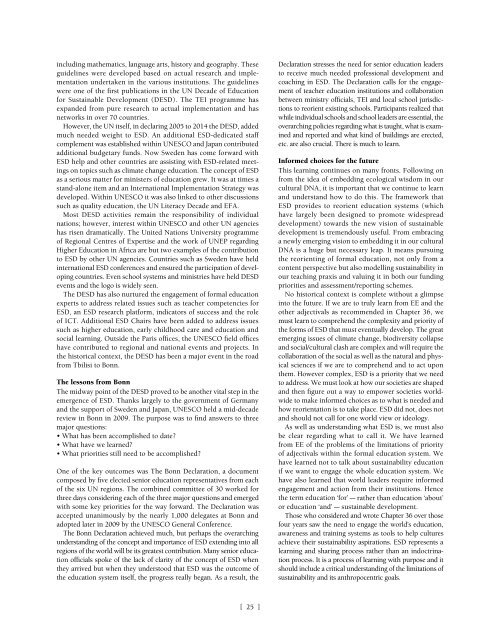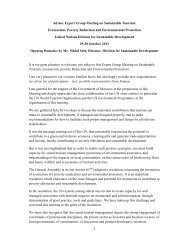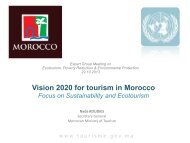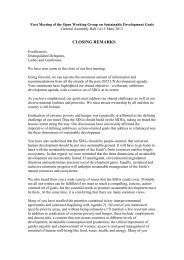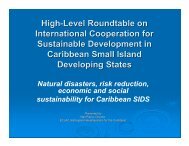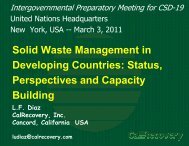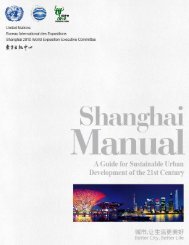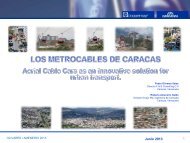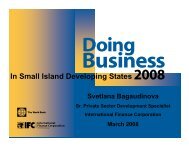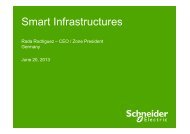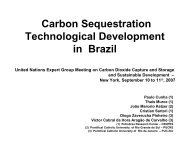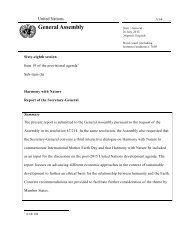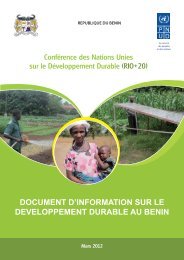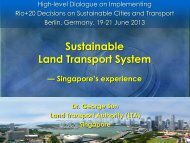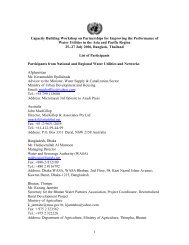Tomorrow today; 2010 - unesdoc - Unesco
Tomorrow today; 2010 - unesdoc - Unesco
Tomorrow today; 2010 - unesdoc - Unesco
Create successful ePaper yourself
Turn your PDF publications into a flip-book with our unique Google optimized e-Paper software.
including mathematics, language arts, history and geography. These<br />
guidelines were developed based on actual research and implementation<br />
undertaken in the various institutions. The guidelines<br />
were one of the first publications in the UN Decade of Education<br />
for Sustainable Development (DESD). The TEI programme has<br />
expanded from pure research to actual implementation and has<br />
networks in over 70 countries.<br />
However, the UN itself, in declaring 2005 to 2014 the DESD, added<br />
much needed weight to ESD. An additional ESD-dedicated staff<br />
complement was established within UNESCO and Japan contributed<br />
additional budgetary funds. Now Sweden has come forward with<br />
ESD help and other countries are assisting with ESD-related meetings<br />
on topics such as climate change education. The concept of ESD<br />
as a serious matter for ministers of education grew. It was at times a<br />
stand-alone item and an International Implementation Strategy was<br />
developed. Within UNESCO it was also linked to other discussions<br />
such as quality education, the UN Literacy Decade and EFA.<br />
Most DESD activities remain the responsibility of individual<br />
nations; however, interest within UNESCO and other UN agencies<br />
has risen dramatically. The United Nations University programme<br />
of Regional Centres of Expertise and the work of UNEP regarding<br />
Higher Education in Africa are but two examples of the contribution<br />
to ESD by other UN agencies. Countries such as Sweden have held<br />
international ESD conferences and ensured the participation of developing<br />
countries. Even school systems and ministries have held DESD<br />
events and the logo is widely seen.<br />
The DESD has also nurtured the engagement of formal education<br />
experts to address related issues such as teacher competencies for<br />
ESD, an ESD research platform, indicators of success and the role<br />
of ICT. Additional ESD Chairs have been added to address issues<br />
such as higher education, early childhood care and education and<br />
social learning. Outside the Paris offices, the UNESCO field offices<br />
have contributed to regional and national events and projects. In<br />
the historical context, the DESD has been a major event in the road<br />
from Tbilisi to Bonn.<br />
The lessons from Bonn<br />
The midway point of the DESD proved to be another vital step in the<br />
emergence of ESD. Thanks largely to the government of Germany<br />
and the support of Sweden and Japan, UNESCO held a mid-decade<br />
review in Bonn in 2009. The purpose was to find answers to three<br />
major questions:<br />
• What has been accomplished to date?<br />
• What have we learned?<br />
• What priorities still need to be accomplished?<br />
One of the key outcomes was The Bonn Declaration, a document<br />
composed by five elected senior education representatives from each<br />
of the six UN regions. The combined committee of 30 worked for<br />
three days considering each of the three major questions and emerged<br />
with some key priorities for the way forward. The Declaration was<br />
accepted unanimously by the nearly 1,000 delegates at Bonn and<br />
adopted later in 2009 by the UNESCO General Conference.<br />
The Bonn Declaration achieved much, but perhaps the overarching<br />
understanding of the concept and importance of ESD extending into all<br />
regions of the world will be its greatest contribution. Many senior education<br />
officials spoke of the lack of clarity of the concept of ESD when<br />
they arrived but when they understood that ESD was the outcome of<br />
the education system itself, the progress really began. As a result, the<br />
Declaration stresses the need for senior education leaders<br />
to receive much needed professional development and<br />
coaching in ESD. The Declaration calls for the engagement<br />
of teacher education institutions and collaboration<br />
between ministry officials, TEI and local school jurisdictions<br />
to reorient existing schools. Participants realized that<br />
while individual schools and school leaders are essential, the<br />
overarching policies regarding what is taught, what is examined<br />
and reported and what kind of buildings are erected,<br />
etc. are also crucial. There is much to learn.<br />
Informed choices for the future<br />
This learning continues on many fronts. Following on<br />
from the idea of embedding ecological wisdom in our<br />
cultural DNA, it is important that we continue to learn<br />
and understand how to do this. The framework that<br />
ESD provides to reorient education systems (which<br />
have largely been designed to promote widespread<br />
development) towards the new vision of sustainable<br />
development is tremendously useful. From embracing<br />
a newly emerging vision to embedding it in our cultural<br />
DNA is a huge but necessary leap. It means pursuing<br />
the reorienting of formal education, not only from a<br />
content perspective but also modelling sustainability in<br />
our teaching praxis and valuing it in both our funding<br />
priorities and assessment/reporting schemes.<br />
No historical context is complete without a glimpse<br />
into the future. If we are to truly learn from EE and the<br />
other adjectivals as recommended in Chapter 36, we<br />
must learn to comprehend the complexity and priority of<br />
the forms of ESD that must eventually develop. The great<br />
emerging issues of climate change, biodiversity collapse<br />
and social/cultural clash are complex and will require the<br />
collaboration of the social as well as the natural and physical<br />
sciences if we are to comprehend and to act upon<br />
them. However complex, ESD is a priority that we need<br />
to address. We must look at how our societies are shaped<br />
and then figure out a way to empower societies worldwide<br />
to make informed choices as to what is needed and<br />
how reorientation is to take place. ESD did not, does not<br />
and should not call for one world view or ideology.<br />
As well as understanding what ESD is, we must also<br />
be clear regarding what to call it. We have learned<br />
from EE of the problems of the limitations of priority<br />
of adjectivals within the formal education system. We<br />
have learned not to talk about sustainability education<br />
if we want to engage the whole education system. We<br />
have also learned that world leaders require informed<br />
engagement and action from their institutions. Hence<br />
the term education ‘for’ – rather than education ‘about’<br />
or education ‘and’ – sustainable development.<br />
Those who considered and wrote Chapter 36 over those<br />
four years saw the need to engage the world’s education,<br />
awareness and training systems as tools to help cultures<br />
achieve their sustainability aspirations. ESD represents a<br />
learning and sharing process rather than an indoctrination<br />
process. It is a process of learning with purpose and it<br />
should include a critical understanding of the limitations of<br />
sustainability and its anthropocentric goals.<br />
[ 25 ]


